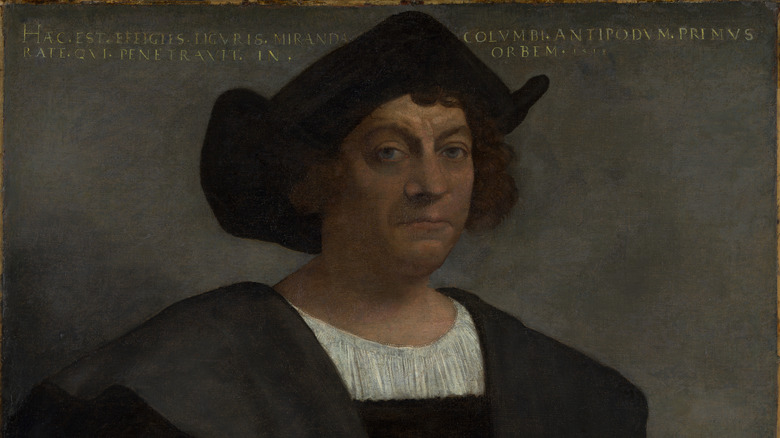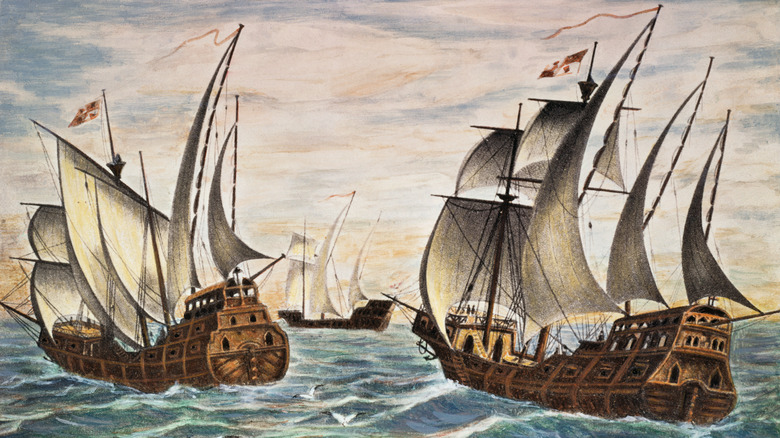How Christopher Columbus Predicted He Would Bring The End Of The World
For centuries after the founding of the United States, the Italian explorer Christopher Columbus (October 1451 – May 1506) was undeniably treated as one of the nation's greatest heroes. Often hailed as the "discoverer" of the Americas, his role in the formation of the New World was seismic. But as scholarship around his accomplishments has gained greater clarity, he is no longer lionized so unquestioningly, as experts continue to highlight the immense human cost of colonialism and the brutal massacre of indigenous people that his exploration helped usher in.
Nevertheless, his travels across the globe a time before the advent of navigational instruments remain impressive, a testament to his incredible skill as a navigator and his incredible knowledge of the way stars and other natural directional aid in crossing unforgiving oceans. Often, when the name Christopher Columbus comes up, it evokes a spirit of scientific exploration, of humanity exceeding the bounds of the known world to discover what exists beyond the horizon. However, the true motives for Columbus' travels were surprisingly metaphysical, with the explorer — who promised riches to his royal patrons in return for funding his voyages — believing that his travels would eventually lead to the apocalypse as prophesied in the Bible.
A Christian route to the East
Christopher Columbus was born in Genoa, Italy, and while the exact circumstances of his childhood are still debated — some historians suggest that his family was Jewish — by his early adulthood Columbus was like most Europeans of his day, an avowed Catholic.
Famously, Columbus didn't set out to discover new lands but to establish new trade routes to the East. With the capture of Constantinople by the Ottoman Empire in 1453, the passage by land to India and China was effectively cut off from European powers, while the Ottomans' victory also effectively dealt a blow to Christians who sought to claim the Holy Land in the name of their religion.
Columbus, who, contrary to myth, believed the world was round, or at least "pear-shaped," believed that he could break the deadlock by uncovering a new route to the Far East across the Atlantic, but to do so he required financing. Columbus had to convince Spanish royals to contribute a sizeable amount to a travel fund established by a group of businessmen, who had their own financial motives for opening a new trade route. Columbus' royal backers were King Ferdinand II and Queen Isabella I, for whom the explorer compiled a document titled "The Book of Prophecies" which he argued offered proof that financing his trip would bring about the Biblical end of days.
Putting apocalyptic events in motion
Christopher Columbus argued that the new trade routes he planned to establish to India and China would generate untold wealth for Christian powers in Western Europe. But while money may be considered an end in itself, some Christians like the Franciscan Brothers came to believe that his travels might effectively roll forward the Christian calendar toward its conclusion.
The new revenue that Columbus' trade routes would supposedly generate for Catholic Spain could be used to finance a new Crusade to the Holy Lands, the ultimate goal of which was Christian control of the holy city of Jerusalem. Texts that Columbus had compiled in his "Book of Prophecies" claimed that Christian rule over Jerusalem would herald the arrival of the Antichrist, and lead to the final apocalyptic battle at the end of the world.
Non-believers may wonder why the end of the world would be a desirable outcome for 15th-century Christians like Columbus and his royal backers. The answer is that Columbus' prophecies stated that such events would usher in a new world, in which the entire population of the planet was Christian. In this way, Columbus could be considered a missionary, though he also undoubtedly had an eye on the untold wealth and fame that he would enjoy in his lifetime if his plan came to fruition.


